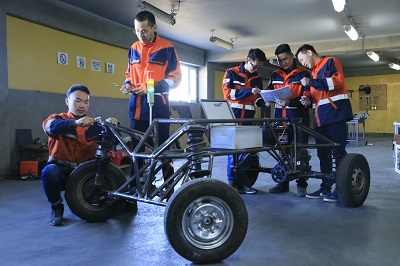Why do we offer Mechanical Engineering for You?
The regular study period of the Bachelor’s program in Mechanical Engineering at GMIT is eight semesters, leading to a Bachelor of Science degree. The entire course encompasses 240 ECTS credits. The program aims to equip students for careers as mechanical engineers, particularly in mineral resources processing within the mining industry and other sectors. Graduates will be involved in research, development, design, and production of various products, ranging from small components to large machinery and vehicles, as well as installation, commissioning, and operations.


The practice-focused Mechanical Engineering Bachelor's program at GMIT is designed to offer a high-quality curriculum aligned with global mechanical engineering education standards. It provides a comprehensive understanding of mechanical engineering principles, theories, and applications across different fields, equipping students with practical engineering skills. The program encourages creativity, innovation, and entrepreneurship to drive technological advancements and contribute to economic growth and societal progress. It also instills a strong sense of ethical responsibility, professionalism, and integrity in engineering practice, emphasizing safety, sustainability, and societal impact. Additionally, it promotes lifelong learning and adaptability to evolving technologies in the field while enhancing students' awareness of global issues and cultural diversity.
Upon completion of the program, students will graduate as mechanical engineers with opportunities for employment across various industries. They can pursue careers in research and development, production, operations, and other related fields. Graduates will possess the skills to design mechanical systems using engineering software while considering safety, sustainability, and cost-effectiveness. They will develop analytical skills to solve complex engineering problems and gain practical experience through internships and hands-on work. The program equips graduates with enduring knowledge to excel in diverse fields of mechanical engineering under varying conditions.
The Mechanical Engineering program emphasizes critical thinking in identifying and formulating engineering problems based on scientific principles. Graduates will utilize CAD software and computational tools to address engineering challenges in their professional roles while considering societal, economic, and environmental impacts. Collaboration is emphasized throughout the program, with graduates expected to work effectively within multidisciplinary teams and demonstrate leadership skills. Continuous learning is encouraged to stay updated on the latest knowledge and technologies in the field.
Employability: The program focuses on applying scientific principles to address real-world challenges in Mongolian society to enhance sustainability. Students engage in project-based learning on various topics such as waste disposal, electricity conservation, indoor air quality enhancement, mineral resources processing plant design, and geothermal power plant development for small villages. Employability prospects for graduates are diverse, with opportunities in the mining industry at companies like Oyu Tolgoi for project management, processing engineering, vehicle maintenance, as well as emerging roles in the renewable energy sector due to Mongolia's focus on wind and solar energy initiatives. Opportunities in manufacturing are growing as Mongolian companies recognize the expertise of GMIT graduates in Mechanical Engineering.

